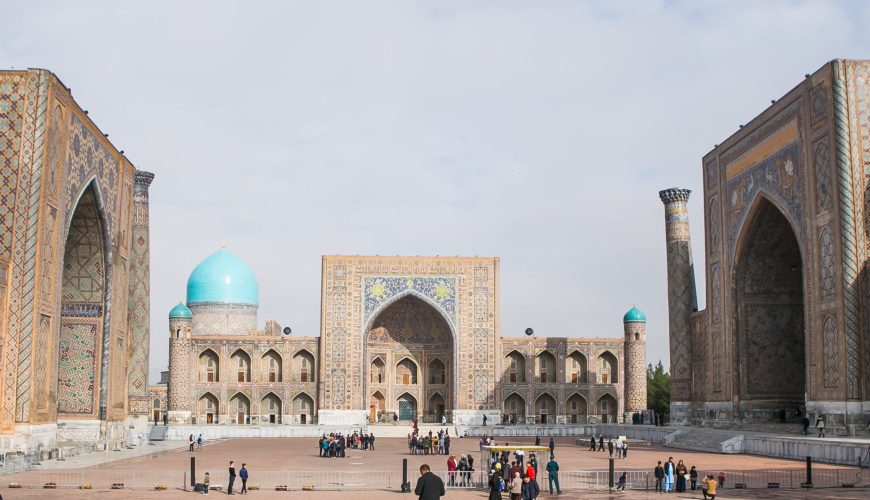Journeys N Tales is happy to partner Uzbekistan Tourism Board for promotion of Indian tourism in the country. The Tourism board is keen to welcome Indian tourist events including Mice programs , Corporate and special events across the country. The country has direct flights from New Delhi to the Uzbek capital of Tashkent via Uzbekistan Airways and more recently Indigo airways.
Get ready to step back in time and explore the Silk Road cities of Uzbekistan, a land steeped in rich history and culture. From Bukhara’s bustling bazaars to Samarkand’s majestic architecture, Uzbekistan will transport you to a world straight out of “Arabian Nights”. Indulge in delicious traditional dishes, shop for unique handicrafts, and immerse yourself in the local customs.
Central Asia is unchartered territory even for the worldliest travellers. Of its five republics Uzbekistan – officially the Republic of Uzbekistan – is the most densely populated. Its name is a combination of the Turkik words ‘uz’ (self), ‘bek’ (master) and the Persian suffix ‘stan’ (country). This essentially translates as ‘Land of the Free’. Intrigued by this offbeat destination? Here are a few interesting facts about Uzbekistan.
Uzbekistan is one of 45 landlocked countries in the world. It’s squeezed between Kazakhstan to the north, Kyrgyzstan to the northeast, Tajikistan to the southeast, Afghanistan to the south and Turkmenistan to the south-west. Not only is it landlocked, but it’s also one of only two doubly-landlocked nations in the world. Each of its neighbouring countries is landlocked too. That means that in order to reach the coastline from Uzbekistan, you’ll need to cross at least two countries. The only other doubly-landlocked country in the world is Liechtenstein.
Russia conquered the whole of Central Asia in the second half of the nineteenth century. The land became Russian Turkestan because most of its inhabitants spoke Turkik languages. The Soviets took control of the region in 1925 and it then became known as the Uzbek Soviet Socialist Republic The country gained independence in 1991. The authoritarian president Islam Karimov ruled the country from 1989 until his death in 2016.
Cotton accounts for 17% of Uzbekistan’s exports. It’s often referred to as ‘white gold’ because it is such a profitable industry, but Uzbek authorities have been criticized for decades by human rights groups. Every year the government forces around 1,000,000 students, government employees and doctors to pick Uzbekistan’s cotton fields. A large proportion of this cotton ends up in global supply chains and in our high street shops. Annual cotton production averages around one million tons of fibre, accounting for 4-5 % of the world’s overall cotton production. Exports usually reach 700,000-800,000 tons, accounting for 10% of the world export. It’s the eighth largest producer and 11th largest cotton exporter in the world.
The Muruntau Gold Mine in the Qizilqum Desert is one of the world’s largest open-pit gold mines. It also has the second-highest level of annual production at 66 tonnes. The pit is around 3.35km by 2.5km and at least 560m deep. It was first discovered in 1958 and commercial mining began in 1967. In 2020, Uzbekistan produced 101.6 tons of gold. Uzbekistan is also the world’s 12th largest gold producer. Gold accounts for around 44% of the country’s exports.
Visa Requirements to Uzbekistan
Uzbekistan has implemented a visa-free regime for citizens of 86 countries, and e-visas for citizens of 57 countries, making it easier for travelers to visit the country. If you are an Indian citizen, you need to apply for an e-visa which is a simple and straightforward process from the embassy.
Transportation
Uzbekistan has an excellent transportation infrastructure, including high-speed Bullet trains called Afrosiyob that connect Tashkent, Samarkand, and Bukhara. These trains are comfortable, mostly on time, and are a great way to explore the country. Trains are the primary mode of transportation between cities in Uzbekistan.
Best Time to Visit
The best time to visit Uzbekistan is during spring (April to May) and autumn (September to early November). It’s typically warm and dry during these periods, with temperatures sitting around 21°C to 30°C during spring and 14°C to 30°C during autumn.
Enjoy the Best Fruits in the World
Uzbekistan has a long history of producing world-renowned fruit crops: stone fruits (peaches, nectarines, cherries, apricots and plums); pome fruits (apples, pears and quince); subtropical fruits (pomegranates and persimmons); and grapes.
Talk to the experts Journeys N Tales and discover the diverse landscape of Uzbekistan !


0 Comment